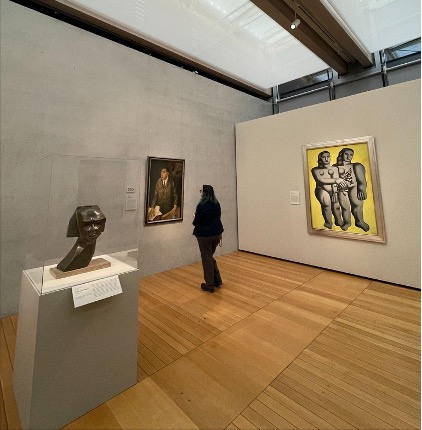The Problem of Otto Dix’s Portrait of Alfred Flechtheim
Dr. James van Dyke, associate professor at Mizzou's School of Visual Studies, gave a lecture at the Kimbell Art Museum in Fort Worth, Texas at the opening of the new exhibition “Modern Art and Politics in Germany, 1020-1945”. The lecture, “The Problem of Otto Dix’s Portrait of Alfred Flechtheim,” focused on a portrait in the exhibition by Otto Dix, also the subject of his second book, currently in production with the University of Chicago Press.
"The exhibition is excellent, offering a remarkable collection of important paintings and sculptures from the collection of this preeminent German museum of modern art, presented to emphasize the often complex, surprising relationships between political ideology, cultural policies, and artistic production in Germany in the early twentieth-century," says Dr. van Dyke.
The lecture discussed the painting’s amalgamation of extraordinary naturalism, caricaturesque excess, and physiognomic stereotypes, and its place in Dix’s oeuvre in order to try to understand its ideological significance.
Dr. van Dyke was one of four speakers: the Deputy Director of the Kimbell Art Museum, the Deputy Director of the Neue Nationalgalerie in Berlin, and Dr. Melissa Venator, Assistant Curator of Modern Art at the Saint Louis Art Museum.
With his scholarly research, Dr. van Dyke recently received two grants that support his third book project, “Shell Oil and the Political Confrontation of the Arts.” The book will examine critically how multinational oil companies employed architecture, photography, graphic design, cartography, and film in the 1930s to promote its products and to defend its corporate interests against a range of critics and threats in England’s constitutional monarchy, Nazi Germany, Fascist Italy, and revolutionary Mexico.
The first grant is from the German Academic Exchange Service (DAAD), a German government agency that supports research and fosters cultural exchange in Germany. This grant will support six weeks of research this coming summer in archives, libraries, and museums in The Hague, Berlin, Leipzig, and Munich. The second grant is an award from the University of Missouri Provost’s Arts and Humanities Research and Creative Works Program, which will support further summer research in Italy, England, and Mexico in 2026 and 2027.
